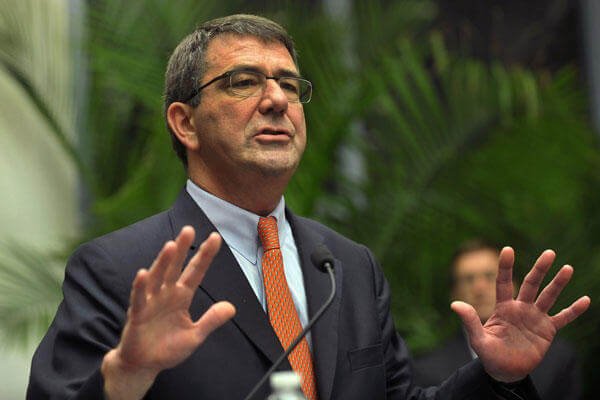Defense Secretary Ashton Carter told Fort Bragg and Pope Army Airfield troops Friday that reducing the Army to 450,000 troops was the only way to ensure that the future force will be well-paid, equipped and ready under current budget constraints.
Carter also signaled that he favored extending the Navy's recently announced policy of 18 weeks maternity leave for female sailors and Marines to all the services, and said that opening up more Military Occupational Specialties to women would increase the recruiting pool.
"I wish we had more money," Carter said in commenting on the Army's plan announced this week to reduce the current force of about 490,000 to 450,000 by Fiscal Year 2018, and possibly to 420,000 by 2019.
"We're trying to do it in a measured and steady way. We're balancing between paying you well," Carter said of the Army's reduction in force that would include 842 soldiers from Fort Bragg, and "having enough of you for all of the needs that we have."
Carter said that the Army was also trying to "make sure that you have the best new equipment" and that "you're trained to the high level of excellence" needed for future conflicts. "You can't do what you do if you don't train all the time. That takes money too."
The Republican-controlled Congress and the White House are currently at an impasse over the defense budget, with President Obama threatening a veto unless the sequestration budget caps were lifted for domestic as well as defense spending. On a rare visit to the Pentagon earlier this week, Obama pledged that the troops would continue to get paid despite the impasse.
Recruiting Women
At Fort Bragg, Carter said that boosting maternity leave and opening up more MOS slots to women were both ways to increase recruitment and retention.
He said the Navy's recent announcement that maternity leave for female sailors and Marines would be tripled to 18 weeks was "just one of a number of adjustments we need to make to make it practical for today's families to continue to serve. We've got to be flexible."
Military families already sacrifice a lot to serve and "we shouldn't make that sacrifice bigger than it has to be," Carter said.
On gender integration, Carter said "we are looking now at the standards that are required" for the infantry, armor, artillery and special operations. "Nobody wants to change standards but we're looking at the standards that are required in some specialties."
Carter said he expected the department to meet the timeline for making recommendations to President Obama by the end of this year "on which if any MOS's should be restricted to women."
Carter said that opening more slots to women across the military would be a plus for the Department by providing "a huge new pool of talented people from which we can pick. That's a pretty good deal for the Department."
The research and testing on gender integration has also given the military an opportunity to "think through what family life and gender life means in practical terms" in the future force, Carter said.
Carter held the town hall session for about 200 troops in a hangar at Pope Army Air Field. He was flanked by two ultra-light vehicles now in testing for airdrops with troops of the 82nd Airborne Division to increase their mobility.
Also in attendance at the nation's largest military installation was Lt. Gen. Stephen J. Townsend, who took over command of Fort Bragg and the 18th Airborne Corps in May from Lt. Gen. Joseph Anderson.
The Army's plan cut 40,000 troops and reduce the force from 490,000 to 450,000 by Fiscal Year 2018 would also include the loss of 17,000 civilian jobs, Brig. Gen. Randy George, director of Army force management, said Thursday.
George said the cuts, estimated to generate about $7 billion in savings, would begin in October and impact virtually every Army installation worldwide.
"These aren't cuts the Army wants to make," Army Vice Chief of Staff Gen. Dan Allyn said Thursday at an Army symposium. "These are cuts required by the budget and by the environment in which we operate."
John W. Stroud, national commander of the Veterans of Foreign Wars, said in a statement Friday: "Sequestration is the most significant military readiness and national security threat of the 21st century, and despite almost universal Congressional opposition to it, no member of the House or Senate has yet introduced any legislation to end it."
"Our military can beat any military in the world, but they can't fight a Congress that is essentially forcing them to operate for a decade on only eight years' worth of funding," Stroud said.
In response to the Army's announcement of the cuts, Sen. John McCain, R-Ariz., said earlier this week that ending sequestration "remains my highest priority. Any conceivable strategic rationale for this cut to Army end-strength has been overturned by the events of the last few years from the rise of ISIL (ISIS), Russia's invasion of Ukraine, the Ebola crisis, and more."
-- Richard Sisk can be reached at richard.sisk@military.com




























